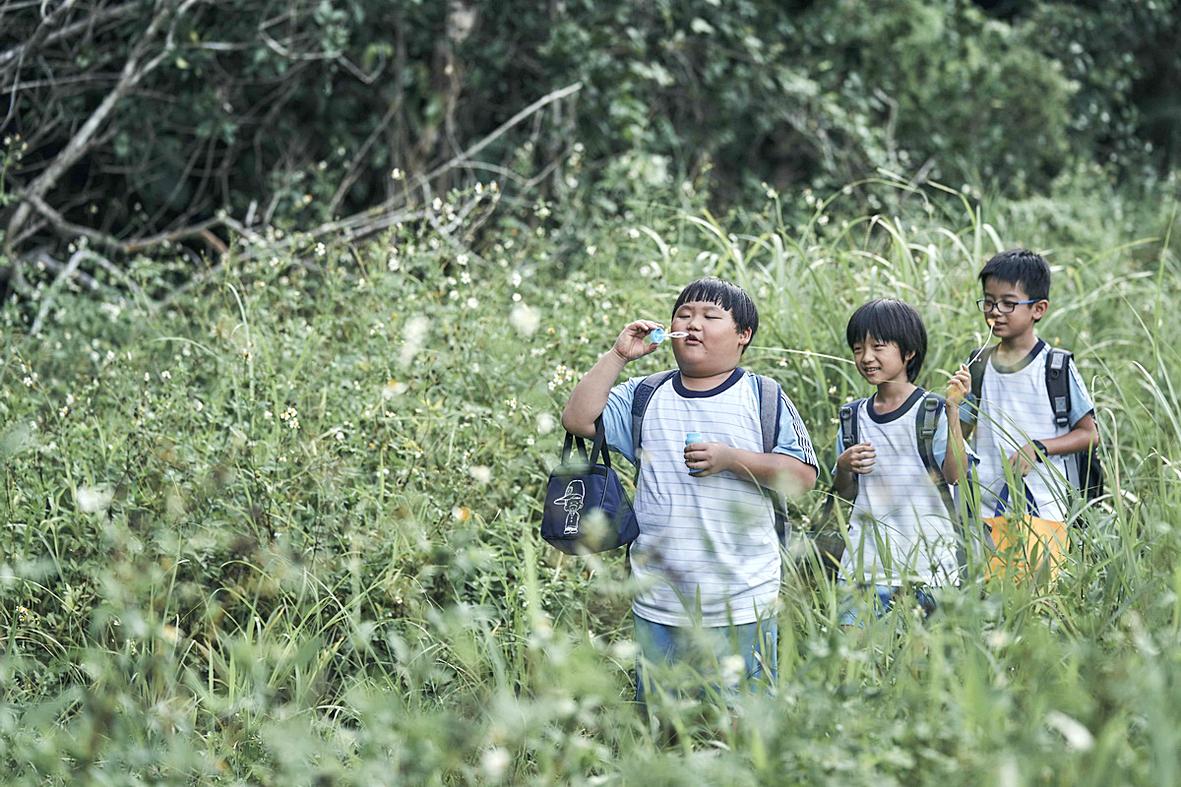Giant nightmare-eating tapirs and other magical elements save this otherwise melancholy and sentimental drama about a little boy dealing with the loss of his father, stopping it from propelling viewers into depression and heartbreak.
The rather conventional premise of Hello! Tapir (嗨!神獸) is designed to bring tears to the viewers’ eyes, but the layers of fantasy — and earnest, hilarious acting from the kids — keep it fresh and wondrous despite the tragic situation. It’s a fitting treatment that feels natural, though, and not just a superficial coating to cash in on the Malayan tapir’s popularity in Taiwan. The special effects are smooth and convincing, seamlessly blending into the picturesque fishing village where the film is set, and earning it a nomination for 2020’s Golden Horse Awards.
Although tapirs only exist in zoos in Taiwan, and while director Kethsvin Chee (池家慶) hails from the animal’s endemic Malaysia, the connection isn’t apparent in the film. In fact, protagonist Keat (Bai Run-yin, 白潤音) simply refers to them as “mythical beasts” (神獸) in Mandarin (although the English subtitles call them tapirs), described by his fisherman father Sheng (Lee Lee-zen, 李李仁) as having the “body of a pig, trunk of an elephant, ears of a horse and legs of a rhinoceros.” When everyone is asleep at night, the beast enters the village and gobbles up everyone’s nightmares, Sheng tells Keat.

Photo courtesy of Applause Entertainment
The chimeric depiction is reminiscent of the legendary Chinese creature mo (貘), which only became known as a devourer of bad dreams after the myth spread to Japan. Due to a 19th-century translation error, however, mo became the Mandarin name for the tapir.
Keat is upset that his busy father has repeatedly reneged on his promises to take him to the forest to find the beasts. Sheng promises Keat once more before heading out to sea — but fails to come home after an accident. Keat and his wholesome pals Bean (Chen Ching-fu, 陳京甫) and Peanut (Lin Yu-chuan, 林佑銓) don’t fully comprehend what’s going on as the distressed adults keep them in the dark. Instead they embark on night expeditions into the magical forest to find the tapirs so that they can end their real-life nightmare and bring Sheng home.
This surrealistic turn is an effective and poignant way to portray how a child may grapple with grief and loss. Keat only knows that something bad has happened and tries in his own way to fix the situation, even getting angry when the adults act like Sheng isn’t coming back. The kids are innocent and likable, and their unintentionally funny dialogue provides appropriate comedic relief to the tragedy. Bai’s nuanced portrayal of an introspective yet strong-willed child who is both innocent and somehow wise beyond his years marks yet another strong showing after 2020’s Dear Tenant (親愛的房客), in which he has also lost his father.

Photo courtesy of Applause Entertainment
The scenes that feature grown-ups such as Keat’s grief-stricken grandma (Lu Hsueh-feng, 呂雪鳳) and mother (Charlie Young, 楊采妮) often veer into melodrama. They also serve as a lesson in not underestimating how much a child may understand. “In this world, everything disappears eventually,” Keat recalls the words of his father in one scene as he watches bioluminescent mushrooms release spores that light up the night sky and then fade away.
An interesting touch is that many of these “nightmares” are based on real-world incidents such as schoolyard bullying and domestic violence, complete with a Taiwanese television news reporter narrating the scenes before the tapir eats them. There’s also a brief scene of Southeast Asian migrant workers in a fishing boat singing a popular Malaysian song about longing for one’s love, but this element isn’t explored further. Perhaps it’s just another nod to Chee’s homeland.
The film is deeply personal for Chee, who also grew up in a fishing town and struggled to find closure after his father suddenly died from dengue fever in 2015. His inspiration for Keat’s character came from his eight-year-old cousin, who asked during the funeral arrangements: “Is uncle coming back?”
The 87-minute production flows pretty well, and although a little more is desired as far as story development — especially the ending — Chee’s directorial debut is a solid, empathetic commercial effort that’s just hard to dislike.

Jacques Poissant’s suffering stopped the day he asked his daughter if it would be “cowardly to ask to be helped to die.” The retired Canadian insurance adviser was 93, and “was wasting away” after a long battle with prostate cancer. “He no longer had any zest for life,” Josee Poissant said. Last year her mother made the same choice at 96 when she realized she would not be getting out of hospital. She died surrounded by her children and their partners listening to the music she loved. “She was at peace. She sang until she went to sleep.” Josee Poissant remembers it as a beautiful

For many centuries from the medieval to the early modern era, the island port of Hirado on the northwestern tip of Kyushu in Japan was the epicenter of piracy in East Asia. From bases in Hirado the notorious wokou (倭寇) terrorized Korea and China. They raided coastal towns, carrying off people into slavery and looting everything from grain to porcelain to bells in Buddhist temples. Kyushu itself operated a thriving trade with China in sulfur, a necessary ingredient of the gunpowder that powered militaries from Europe to Japan. Over time Hirado developed into a full service stop for pirates. Booty could

Lori Sepich smoked for years and sometimes skipped taking her blood pressure medicine. But she never thought she’d have a heart attack. The possibility “just wasn’t registering with me,” said the 64-year-old from Memphis, Tennessee, who suffered two of them 13 years apart. She’s far from alone. More than 60 million women in the US live with cardiovascular disease, which includes heart disease as well as stroke, heart failure and atrial fibrillation. And despite the myth that heart attacks mostly strike men, women are vulnerable too. Overall in the US, 1 in 5 women dies of cardiovascular disease each year, 37,000 of them

Before the last section of the round-the-island railway was electrified, one old blue train still chugged back and forth between Pingtung County’s Fangliao (枋寮) and Taitung (台東) stations once a day. It was so slow, was so hot (it had no air conditioning) and covered such a short distance, that the low fare still failed to attract many riders. This relic of the past was finally retired when the South Link Line was fully electrified on Dec. 23, 2020. A wave of nostalgia surrounded the termination of the Ordinary Train service, as these train carriages had been in use for decades